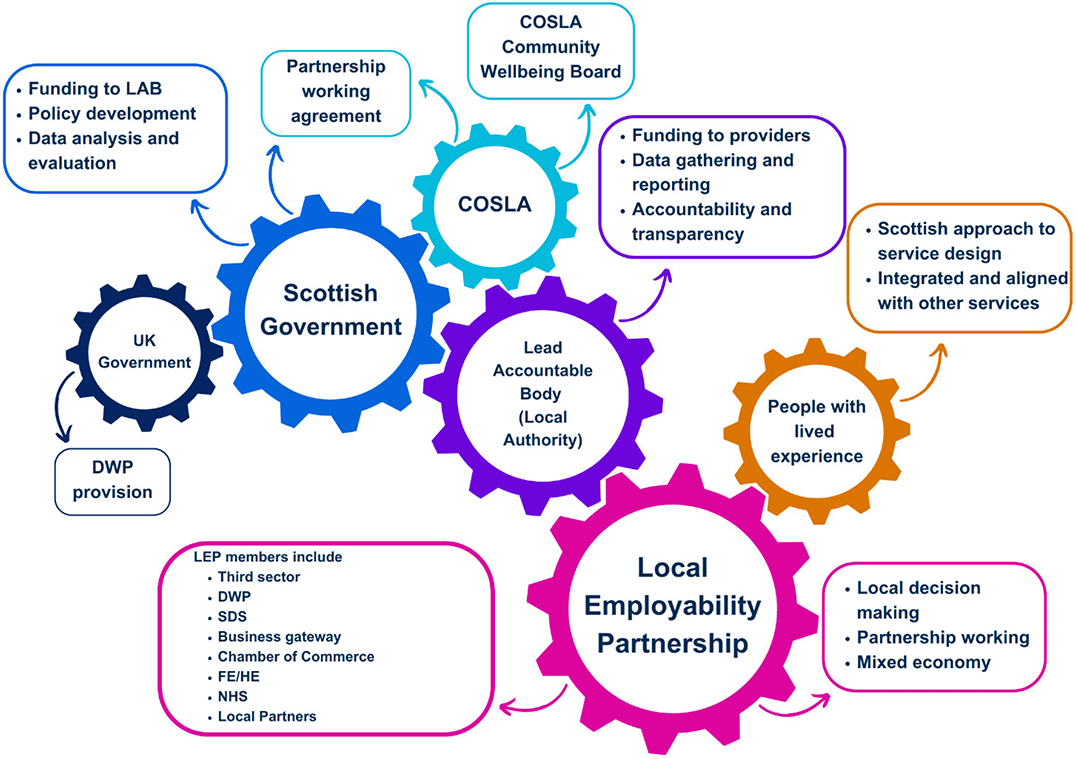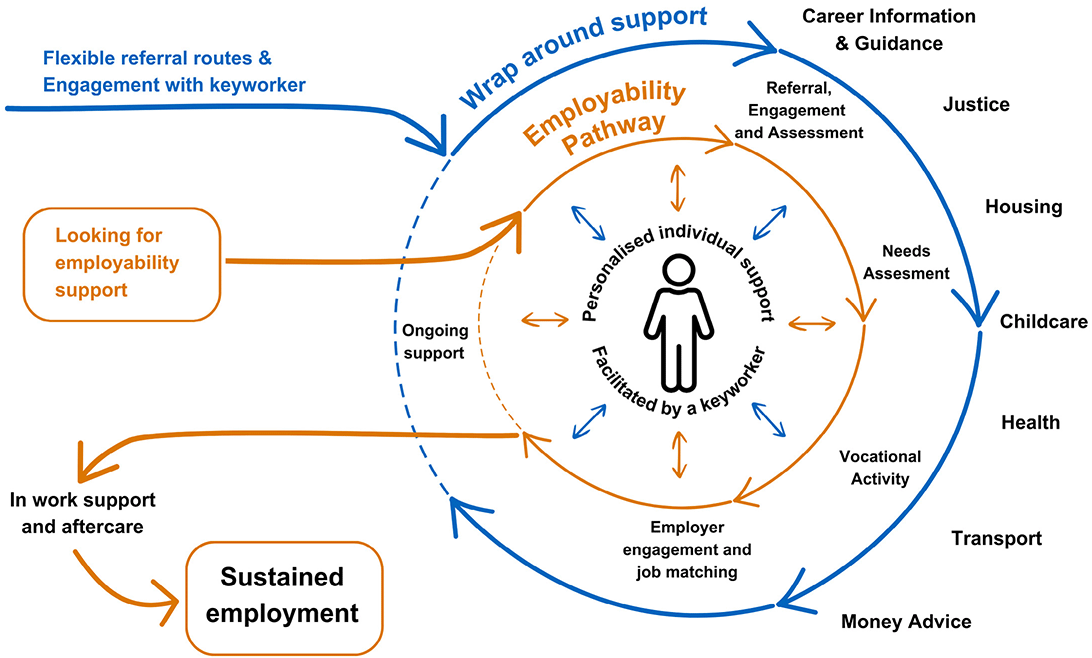No One Left Behind: employability strategic plan 2024 to 2027
Outlines the key priorities for No One Left Behind over the next three years, and identifies the actions we will take to deliver on these priorities, reaffirming our commitment to continuous improvement.
5. No One Left Behind delivery model
No One Left Behind seeks to drive closer working at a national level on policy issues which often cut across different spheres of Government, whilst facilitating greater scope for decisions to be made closer to the people they impact.
Our delivery model has been designed to strengthen alignment between national and local funding, and to support the leveraging of investment from a range of organisations to better deliver on ambitions, which are often shared. The Local Employability Partnership is the keystone of this, bringing together a range of agencies, organisations, and partners to plan and implement provision in their area.
National level activity is supported primarily between a partnership working agreement with COSLA and Scottish Government, which ensures joint political oversight between Scottish Ministers and the COSLA Community Wellbeing Spokesperson (including the COSLA Community Wellbeing Board).
As set out under priority 1 below, there is a planned review of the supporting documentation for the delivery model, including the Local Employability Partnership Framework. This review will be informed by the No One Left Behind and the Young Person’s Guarantee: implementation evaluation, and feedback from partners to date that states this should explicitly recognise the Local Authority’s role as lead accountable body.

Lead Accountable Body
The Scottish Government awards funding for employability to local authorities, which act as the Lead Accountable Body in the funding relationship.
Local Authorities manage funding on behalf of the Local Employability Partnership and are responsible for reporting on the use of funding, both in terms of data (in line with the Shared Measurement Framework) and qualitative narrative on delivery (aligned to Service Standards and policy intent).
Local Employability Partnerships
Local Employability Partnerships play a critical role in the planning and commissioning of employability services locally. Partners around the table also have a role to play in strategically guiding employability provision locally, including thorough evidencing and prioritising local need based on their knowledge, experience, resources and data.
There is a Framework in place to guide the operations of Local Employability Partnerships and to establish a degree of commonality in membership. This framework allows for minor variations in approach locally, and will be strengthened through a review, as set out in the actions below. The Employability Service Standards also set out expectations of Local Employability Partnerships more broadly.
Participant Experience
Moving into employment is not always straightforward. To align with our definition of employability, services must be set up in a way which recognises that successfully supporting people to access sustainable and fair work, or progress within work, requires a more holistic approach to service provision and more inclusive definitions of success. Although we want to ultimately support people into jobs, it’s also important that we recognise the significance of outcomes, other than employment, that our services support people to achieve. For example, participating in volunteering can be an important part of someone’s journey by offering an opportunity to gain experience, build skills and confidence.
We know public services are complex, and how people navigate them can impact significantly on the outcomes they experience. This is why a relational key worker model is central to the No One Left Behind approach. As set out in our service standards, everyone accessing our services should have a single point of contact to act in a trusted professional role.
Participant journeys are based on the 5-stage employability pathway model, which has been widely adopted and should be used flexibly based on people’s circumstances. This pathway is not linear, and it must be recognised that people may move backwards as well as forwards. Employability services must be flexible enough to accommodate this, and continue to provide support.

Case Study
Third sector partnership approach
Enable Work’s ‘All in’ partnership model has been operational since 2015, beginning with All in Edinburgh and expanding into Dundee in 2019, Glasgow in 2022, Moray in 2023 and Aberdeenshire in 2024. Comprising of 26 Third Sector providers across Scotland, the partnerships recognise the unique specialisms and expertise of each organisation and that by working together they can offer services that respond to a range of barriers and acknowledge intersectionality.
Enable Works “All In” partnerships were created to deliver the principles of No One Left Behind, providing person-centred services, that simplify the employability landscape while connecting partners to better work together to deliver high quality services that offer a lasting impact for our participants and commissioners.
Enable Works said:
“Our partnerships deliver genuine collaboration over competition, bringing together organisations who have historically been seen as competitors, to pool together our expertise, reach, skills and knowledge to deliver services that are values driven, flexible to local need and provide a lasting impact. We design partnerships that bring together third sector providers with demonstrable strengths in the priority areas for our customers, meeting local and national priorities.”
Contact
Email: nooneleftbehind@gov.scot
There is a problem
Thanks for your feedback